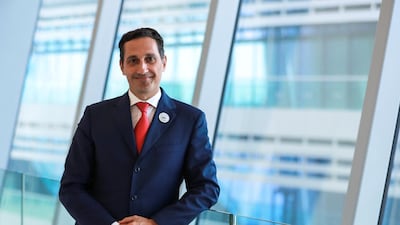Etihad Credit Insurance, the federal export credit agency, aims to back UAE companies with Dh3.3 billion ($898.4 million) in revolving credit guarantees, the equivalent of Dh10bn worth of non-oil trade, by year-end to give them a competitive edge in export markets.
The agency has so far issued Dh2.5bn of revolving credit guarantees, the equivalent to Dh7.5bn worth of non-oil trade, Massimo Falcioni, chief executive of Etihad Credit Insurance, told The National on Wednesday.
It also plans to offer Dh2bn in bank guarantees to UAE lenders to help local businesses get easier access to trade finance, he said. Other year-end targets include granting UAE companies at least Dh200m in project financing and at least Dh100m to protect local investors against political risk in host countries.
"It’s a call to action for manufacturers and exporters in the UAE to approach ECI to learn about how they can be very competitive through solutions the government has designed for them," Mr Falcioni said. "Now is the time to act."
ECI backs UAE manufacturers by facilitating access to trade finance, which boosts their exports, enhances their competitiveness in international markets and reduces the cost and timeline of obtaining funds.
The UAE is focused on developing its local manufacturing industry to diversify its economy, create jobs, attract foreign investment, improve local skill sets and export locally-made products. As part of its strategy to drive industrial growth, the Gulf country aims to double the industrial sector's contribution to national economic output to Dh300bn by 2031, from Dh133bn currently.
The export credit agency expects to support this initiative, dubbed Operation 300bn, through its various offerings, Mr Falcioni said.
"We want to play an important role to give opportunities to these manufacturers to export and to bring the 'Make it in the Emirates' brand everywhere in world," Mr Falcioni said. "Our first goal is to make manufacturers in the UAE competitive and to give them access to international markets."
The agency will secure Dh10bn worth of non-oil trade, with at least half the amount directed to local manufacturing exporters and the remainder to help firms pay their suppliers, Mr Falcioni said.
Producers benefiting from the credit insurance include those working in industries such as chemicals, cables, metals, packaging, food, automotive and healthcare, he added.
Of the Dh3.3bn in revolving credit guarantees, ECI has so far issued Dh2.5bn in credit guarantees to facilitate exports and backed transactions with more than 4,000 companies, he said.
To help UAE companies undertake projects in other countries, ECI will extend Dh2bn in project finance, Mr Falcioni said.
Companies in sectors including renewable energy, waste management and infrastructure development such as tourism projects will benefit from this support, he said.
The agency will also make it easier for UAE companies to access trade finance from banks in the country by covering the lenders' risk.
"Any risk they take in trade finance is covered by ECI so the banks' risk is very minimal," Mr Falcioni said. "ECI assumes up to 90 per cent of the risk the bank is taking in trade financing the receivables of companies."
ECI is also highly focused on small-and-medium enterprises (SMEs), which have received 24 per cent of the Dh2.5bn in revolving credit guarantees issued so far, he said.
The agency is currently working with the Ministry of Economy on a unified portal for exporters to state their trade finance requirements and be directed to the relevant government entity for support, Mr Falcioni said. The state bodies include ECI, Emirates Development Bank, Khalifa Fund for Enterprise Development and Abu Dhabi Exports Office.
"They want one clear entry point where they can explain their needs and get solutions," he said. "It's an easy and simplified approach, one interface for multiple solutions."
Mr Falcioni said the global trade outlook is brighter this year and expects at least a 10 to 12 per cent year-on-year increase in international trade flows as Covid-19 vaccine campaigns ramp up.
Global trade grew by 10 per cent in the first quarter of 2021, driven by strong exports from East Asian economies, the United Nations Conference on Trade and Development said in May. It is set to increase by 8 per cent this year, according to the World Trade Organisation.
During the Covid-19 pandemic, UAE companies backed by ECI increased their turnover by 20 to 30 per cent on average as they reacted to the crisis by shifting their operations from countries under lockdown to areas that had the virus under control, Mr Falcioni said.
Last year, the UAE and Israel's export credit agency signed a co-operation agreement aimed at boosting trade ties between the two countries.
Since then, the agencies have identified projects in Africa where they can both contribute, Mr Falcioni said. These include opportunities for projects in water treatment, healthcare, tech, IT and digital infrastructure.


